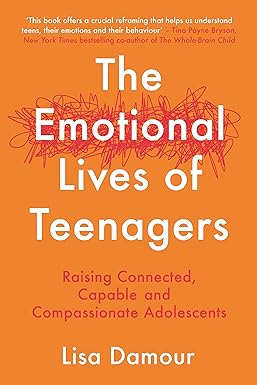
While my friends all thought it was weird, when I was a teenager, I talked to my parents about the boys I was interested in. My extremely patient mom consoled me when one boy or another didn’t seem to know I existed, and my dad and I had long conversations about how one should behave when you care about someone—what we would now call conversations about respect and consent. So, it wasn’t strange for me to have similar conversations with my own kids.
While teens typically go to peers to work out these new feelings (as if any of them really know what they’re talking about), many teens will actually welcome advice from someone who has been there. If you can set aside your worries about your child dating, you can be a great source of accurate information and help guide them to successful relationships throughout their lives. The following are some potential talking points to help you get started.
5 Topics to Discuss with Your Teen Before They Start Dating
1. How they define dating
While this was true even when we were in middle and high school, different generations have different ideas of what the word “dating” means. To some, it is any interaction (texting, online gaming, or outings) with a romantic interest or a crush, while to others it is an exclusive relationship with a boyfriend or girlfriend. Understanding the current jargon will help you establish a baseline to truly get how serious your teen’s relationships are. (Note that this definition may change and you may have to have this conversation more than once.)
Also, talk about any guidelines you feel are appropriate for your family. Some parents may set a minimum age or encourage group dates for younger teens, rather than spending time alone. While teens may think it archaic, parents might insist on meeting a date, if only to say hello. However, it also helps to show that you understand how things are different today. For example, talk about the potential risks of social media and online communication. Even though it will be uncomfortable, bring up the topic of sexting and how some people will request nude photos. (Be prepared for the likelihood that your child knows someone who has done this.) Being open to a general conversation about dating (without judgment!) will make it more likely your teen will come to you with questions or concerns as they come up.
2. What makes a good relationship
Get them thinking about what a good relationship looks like before they start dating. Talk about mutual respect, a sense of humor, compatibility, common interests and values, and healthy boundaries. Share your opinions, but also ask about theirs. What qualities do they think are most important? Are there “deal breakers” that would cause them to break up with someone or not enter a relationship to begin with? Point out examples of healthy relationships. If Grandma and Grandpa have been happily married for 60 years, casually mention what you see as the glue that holds them together, or have your child ask them to share the secret to a long and happy relationship.
Come up with scenarios that would demonstrate values that you think are important. Ask how they would react if a significant other wanted them to choose between spending time with them or a grandparent or another friend. Talk about ways jealousy and insecurity can manifest in behaviors (which, in extreme cases, can lead to teen dating violence) and whether it’s okay to change your plans just to keep the peace. Make sure they know that while physical affection is part of many relationships, it is not what is most important and that no one should be pressured to do something they don’t want to. (And remind them that it’s okay to change your mind, even if you said yes before). Even if college is years away, talk about the difficulties of long-distance relationships.
3. The importance of maintaining non-romantic relationships
We don’t have to mention that many young relationships don’t last, or how friends help you get through a breakup, but teens sometimes need reminders to not neglect their friends. Romantic relationships are new and exciting, but you don’t want to get so caught up that you neglect other important people in your life.
Talk about your own friends and if you have examples to share, talk about the hurt feelings that result when one has been tossed aside for the latest significant other. If you’re lucky enough to not have personal experience, you’ve likely seen or heard of people who got so caught up in a relationship that they stopped reaching out to friends or even returning their calls (or to put it in teen terms, texts). This can result not only in hurt feelings, but in friendships being lost as well.
Related: Dear Teen, This Is What I Want You to Know About Friendship
4. The importance of pursuing your own passions
It’s always good to be open to new experiences. Encourage your teen to learn about their SO’s interests and hobbies but also talk about their own. One of my kids starting dating someone who was a nice person, but there was a subtle change that concerned me. There weren’t any red flags, but many of these dates were spent sitting around, watching TV, going to movies or out to eat. While there’s nothing wrong with this, this child was previously more active. Many adults report they regret losing themselves in a relationship and put aside dreams and passions. Remind them how much fun it is to try new things and that they should do so even if their significant other isn’t interested. (Suggest they ask those friends they haven’t alienated.)
Spending time apart is good for a relationship. It’s normal to want to spend time with your person in this new relationship, but spending all the time together isn’t healthy. In order to grow, we need to occasionally do some reflecting. While it’s fine to make plans to do and achieve things as a couple, it’s also important to set goals as individuals. And no matter how much two people have in common, there will always be some things that only one has an interest in. Point out that it’s always more fun to spend time with someone who truly loves an activity rather than insisting a significant other participate in something they clearly don’t enjoy. Doing things with others also gives you something to talk about when you see each other again.
5. The power of physical attraction
Noticing your child be noticed is one of the more challenging things about being a parent. Even though teens are known for being self-absorbed, they are also known for being insecure. Many are unsure how to react to this sort of new attention (and some may be oblivious to it happening at all). They may dress to hide or accentuate changing bodies and many parents lose sleep as they consider the possible dangers out there. Many relationships start because of physical attraction, and, largely due to their overactive hormones, teens are often unprepared for the force of these feelings.
Parents need to go beyond the birds and bees talk. I told my kids that sex is more than an act—it also stirs up intense emotions. I told them that I feel it is something that teens aren’t emotionally ready for and that, while it’s not my choice to make, I hoped they would wait, if not for marriage, at least until they were in a committed relationship. I told them that any kind of physical attention needs to be consensual. Both parties need to understand how the other one feels or someone is going to get hurt. As far as I’m concerned, if you can’t talk about it, you shouldn’t be doing it. (And this refers to any physical contact, not just intercourse.)
Related: Parents Need to Take Every Opportunity to Talk About Sex
I’m not sure any parent is truly prepared for their child to start dating. While we may have fond memories of those early dating days, we may also have some unpleasant ones that can impact how we think about teen relationships. Parents also look at all this through a much different lens, and are much more aware of the potential risks than our children are. These conversations may make us uncomfortable, but study after study shows that parents have much influence over their teens—as long as we continue to talk to them.
Looking for additional resources to help you navigate this phase of parenting teens?
We recommend The Emotional Lives of Teenagers: Raising Connected, Capable and Compassionate Adolescents. With concrete, relatable explanations embedded in vibrant, real-life anecdotes, The Emotional Lives of Teenagers gives parents the science-based information they need to guide their teens through a challenging developmental phase during challenging times.

Parenting teens is a tough job, but you’re not alone. These posts might help:
Gifts For Teens They’ll Actually Like!
Protect Your Relationship with Your Teen — Don’t Make These Mistakes
Teens Hate These Five Questions, So Ask These Instead
*This post may contain affiliate links where we receive a small commission for purchases made from our site.






Leave a Comment